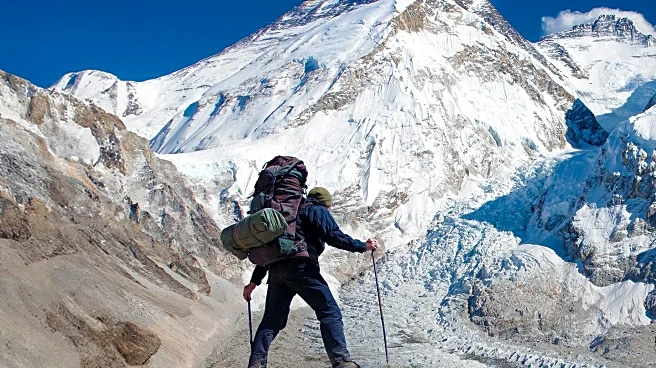What's Happening?
Kanchha Sherpa, the last surviving member of the pioneering 1953 Mount Everest expedition, has died at the age of 92 in Kathmandu, Nepal. Sherpa was part of the team that helped Edmund Hillary and Tenzing Norgay reach the summit of Mount Everest, although
he did not climb to the peak himself. His death marks the end of a significant chapter in mountaineering history. Sherpa was well-respected in the climbing community and remained active in the expedition sector until the age of 50. He expressed concerns about overcrowding and pollution on Mount Everest, urging respect for the mountain, which is revered by the Sherpa people.
Why It's Important?
Kanchha Sherpa's passing is significant as it closes a chapter in the history of mountaineering, highlighting the legacy of the first successful ascent of Mount Everest. His concerns about the current state of Everest reflect broader issues in adventure tourism, such as environmental degradation and cultural disrespect. The Sherpa community, known for their mountaineering expertise, faces challenges in balancing tourism with preserving their cultural heritage. Sherpa's life and work underscore the importance of sustainable practices in high-altitude expeditions, which are crucial for the future of the region's tourism industry.
What's Next?
The passing of Kanchha Sherpa may prompt discussions within the mountaineering community about the future of Everest expeditions. Stakeholders, including local governments and international climbing organizations, might consider implementing stricter regulations to address overcrowding and environmental concerns. The Sherpa community may also advocate for policies that protect their cultural sites and promote sustainable tourism. As the last rites for Sherpa are held, there could be renewed focus on honoring the contributions of the Sherpa people to mountaineering history.
Beyond the Headlines
Kanchha Sherpa's life story highlights the cultural and ethical dimensions of mountaineering. His mixed feelings about the commercialization of Everest reflect broader concerns about the impact of tourism on sacred sites. The Sherpa community's role in expeditions raises questions about fair compensation and recognition for their contributions. Sherpa's legacy may inspire future generations to pursue mountaineering with a focus on cultural respect and environmental stewardship.















